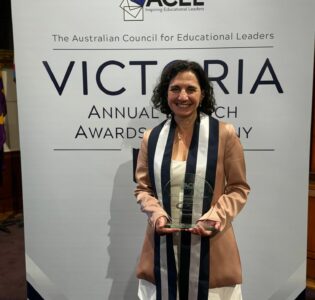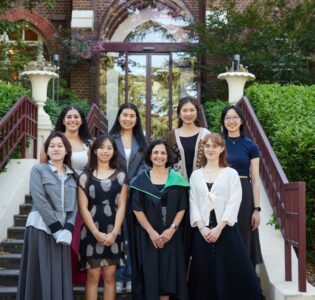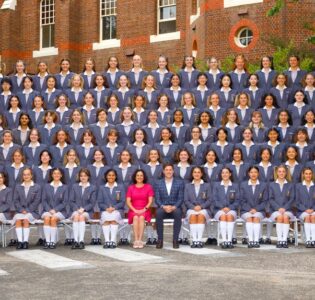Brain Science Trail-blazers
28 August 2019
The science of learning is a booming field, with public interest at an all-time high. Having set up an in-house research institute two years ago, Genazzano FCJ College is ahead of the curve. LeadershipEd spoke to the institute’s director to get the inside scoop.
By Geordie Little

GENAZZANO FCJ College is working to unlock the secrets of the human brain.
In 2017, the college set up the Genazzano Institute of Learning and Brain Sciences to promote educational research and translate it into classroom practice – with powerful results.
Catherine Bandon is an educational and developmental psychologist, and the director of the Genazzano Institute of Learning and Brain Sciences.
“Teachers are learning about the brain and how best to translate the research that’s out there on human learning into practical classroom strategies for their own contexts,” she says.
“So we’ve got, so far, over 100 projects that have been done by the teachers, so that’s been a really significant initiative of the institute.”
Genazzano principal Karen Jebb was the driving force behind the setting up of the institute.
“The idea was to embrace the research that’s happening in neuroscience, education, technology and health and support our teachers to have the best professional learning opportunities for improved teaching and learning in the classroom.” Brandon says.
“We also have some student programs that we’re running to enable our students to learn more about their own brains, and we promote events such as learning seminars in the community as well, so that we can share this knowledge.”
The institute recently ran a free, nation-wide “Explain the Brain 2019: The Addicted Brain” competition.
Students from around Australia were invited to create a 90-second video or an infographic to explain and explore addiction and the brain.
To further its goals, the institute has developed partnerships with other education organisations.
“We’re working with Deakin University on a project to teach Year 9 students about research,” Brandon explains.
“Students have the opportunity to learn from Deakin researchers about ethics and how to put a research project together and then they design their own projects.”
“We also work with Girls Invent, because we’re encouraging girls to push the boundaries with their thinking and to have the confidence to work on their own design projects and inventions.”
The institute has also worked with educational neuroscientist Dr Jared Cooney Horvath.
“We have collaborated with Dr Horvath to develop a significant professional learning course for our staff, so that is something that’s been rolled out over three years.” Brandon says.
Horvath recently told EducationHQ about the need for neuroscience to partner with schools and teachers.
“The only thing science can tackle is the learning process, which is very different than the craft of teaching. Teaching is an activity, learning is a process. It’s something that happens inside of us. Teaching is something we physically do,” He says.
Horvath argues that the conceptual inspiration is the key thing scientists have to offer teachers.
“… like when they learn that human beings can’t listen to somebody speaking while reading simultaneously, they might get a new idea like ‘oh, maybe I need to stop reading aloud to my kids’ and ‘maybe I need to take words off my PowerPoint slides and thing about handouts’.
“But when it comes to the practical ‘how do I actually apply this,’ that has to be done by teachers with teachers – no scientist can ever do that…”
For the best results, teachers and scientists must work in tandem, Horvath says.
“…we’ve got to give [teachers] back their power to say ‘let us handle this. We’ll tell you how this works in the classroom. You do the learning, we’ll do the teaching, and together we’ll build a big story.”
The institute also hosted a free community event ‘Boost your Memory’ with Horvath, and he presented at the recent ‘The Science of Learning: Education with the brain in mind’ conference, which resulted from a partnership between Genazzano and the Australian College of Educators.
In the future, Brandon hopes that the institute can delve further into research outside the school.
“We are working on a brain tech centre to engage and excite students in working with technology for deeper and different learning,” she says.
“In 2020 we will offer new opportunities in professional development for educators, and more community events on learning and the brain.”
Neurodiversity advocacy is another key priority for the Genazzano Institute of Learning and Bran Sciences.
“We are interested in promoting neurodiversity o support all of our learners and to teach our students to embrace and support diversity,” Brandon says.
“It’s all about understanding that all brains have differences in learning and in processing and we aim to support the celebration differences. Diversity makes any environment richer and that leads to more ideas and productivity.”
In a Q&A on the Genazzano Institute’s website, principal Karen Jebb explained her philosophy around brain sciences.
“The more teachers that know about the specifics of how we learn, the better they will be able to plan lessons for optimal student learning outcomes,” Jebb says.
“A more purposeful, planned and deliberate approach can occur. Teachers will become even more skilled at teaching their students.”
Jebb says that the institute has had a powerful effect on teachers.
“… the conversations, sharing of data, collaboration and authentic classroom research [have] ignited another level of energy and passion for teaching, particularly when teachers anve been able to measure the impact of their teaching on learning through the implementation of a specific principle of learning,” she says.
Students stand to benefit greatly from the program as well, Jebb says.
“If students understand more about the brain and how the learn, they can therefore maximize the opportunities teachers provide in class and beyond.
“They will have a better understanding of how to become an independent and empowered learner.
The future of learning is wide open, Jebb says.
“Learning is a wonderful journey that can be embraced by regular and positive feedback, and if students can see a more tangible growth in their learning because there is a great understanding of how to learn, then there will be no limits of what can be achieved.”
“I see an increase in self-esteem, enjoyment and an openness to learn something new.”
Article originally published in the Term 3, 2019 edition of LeadershipEd AU




